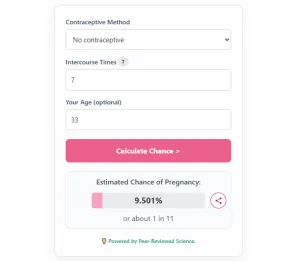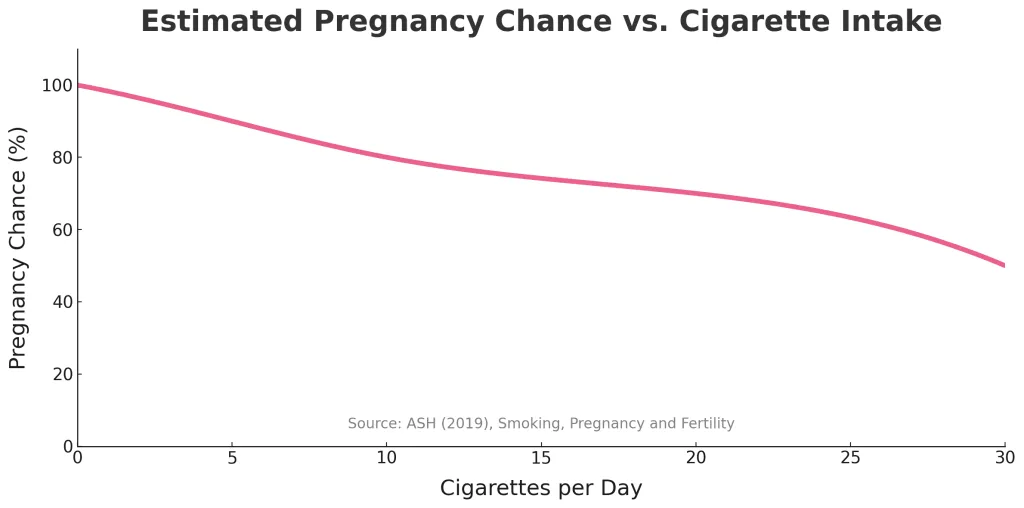Get an instant estimate of your chance of pregnancy, based on published research and the details you enter.
How to Use Our Calculator
- Enter the number of intercourse events you want to estimate for (any time frame).
Only one event? Try the One-Time Calculator. - Enter your age (optional) and .
- Choose a contraceptive method (optional) - leave as “No contraceptive” if none was used.
- For a more accurate result, use the 'Advanced Settings' inputs. The more you use, the more precise our estimate will be.
- Press Calculate
We don’t store your inputs. Results are estimates and show a capped range (never exactly 0% or 100%).

How Our Calculators Work: The Science Behind Your Estimate
At Pregnancy Chance Calculator, we use proven mathematical models and data from dozens of peer-reviewed scientific studies to estimate your probability of conception.
Think of it like a weather forecast - it doesn’t predict outcomes with 100% certainty, but it gives you a science-backed probability based on real-world data.
The Key Factors in Our Algorithm
Female Age
A primary driver of fertility. Our model accounts for the natural decline in egg quantity and quality over time, based on guidelines from the American College of Obstetricians and Gynecologists (ACOG).
Male Age
Male fertility also declines with age, affecting sperm health. Our algorithm considers this factor, especially for partners over 40, as supported by research on paternal age.
Intercourse Timing
We analyze the timing of intercourse relative to the fertile window, incorporating data showing that intercourse frequency can be more effective than targeted ovulation timing alone.
Body Mass Index (BMI)
A healthy BMI is crucial for hormonal balance. Our calculations are adjusted based on studies linking BMI to fertility outcomes.
Lifestyle Factors
Our advanced models incorporate data on how choices like smoking or alcohol consumption can impact hormonal regulation and overall fertility.
Contraceptive Use
We use large-scale study data, including the landmark Trussell (2011) study on contraceptive failure, to factor in typical and perfect-use rates.

Foundational Data Sources & Primary Research
- Contraceptive failure rates: Trussell 2011; Kost et al. 2008
- Age & fertility: Hendershot et al. 1982
- Behavior/timing: Frequency vs timing
For a complete list of the dozens of studies and data sets used in our models, please visit our full Research Library.
Frequently asked questions
How many days after my period will I conceive?
When is the 100% chance of getting pregnant?
How can I be sure I ovulated?
How reliable is the withdrawal method?
How long can sperm live in the body?
Can I use this if my cycles are irregular?
Does breastfeeding change my chances?
Medical disclaimer
The information and calculators on this site are educational tools only. They provide statistical estimates based on published research and the details you enter.
They cannot diagnose, predict what will happen for you, or replace personalized advice from a licensed health care professional who knows your full history. Always talk with your doctor, midwife, or other qualified clinician before making decisions about your health, fertility, or pregnancy.
Never ignore, avoid, or delay seeking professional medical advice because of something you read here or a result you see in a calculator. If you think you may be having a medical emergency, call 911 in the United States or your local emergency number.
